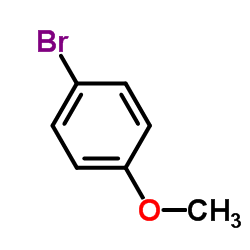4-Bromoanisole

4-Bromoanisole structure
|
Common Name | 4-Bromoanisole | ||
|---|---|---|---|---|
| CAS Number | 104-92-7 | Molecular Weight | 187.034 | |
| Density | 1.4±0.1 g/cm3 | Boiling Point | 223.0±0.0 °C at 760 mmHg | |
| Molecular Formula | C7H7BrO | Melting Point | 9-10 °C(lit.) | |
| MSDS | Chinese USA | Flash Point | 94.4±0.0 °C | |
|
Contributions of BrCl, Br2, BrOCl, Br2O, and HOBr to regiospecific bromination rates of anisole and bromoanisoles in aqueous solution.
Environ. Sci. Technol. 49(8) , 4937-45, (2015) When bromide-containing waters are chlorinated, conventional wisdom typically assumes HOBr is the only active brominating agent. Several additional and often-overlooked brominating agents (including BrCl, Br2, BrOCl, Br2O) can form in chlorinated waters, albe... |
|
|
Hypobromous acid, a powerful endogenous electrophile: Experimental and theoretical studies.
J. Inorg. Biochem. 146 , 61-8, (2015) Hypobromous acid (HOBr) is an inorganic acid produced by the oxidation of the bromide anion (Br(-)). The blood plasma level of Br(-) is more than 1,000-fold lower than that of chloride anion (Cl(-)). Consequently, the endogenous production of HOBr is also low... |
|
|
Pd-catalyzed carbonylative α-arylation of aryl bromides: scope and mechanistic studies.
Chemistry 19(52) , 17926-38, (2013) Reaction conditions for the three-component synthesis of aryl 1,3-diketones are reported applying the palladium-catalyzed carbonylative α-arylation of ketones with aryl bromides. The optimal conditions were found by using a catalytic system derived from [Pd(d... |
|
|
Latent carcinogenicity of early-life exposure to dichloroacetic acid in mice.
Carcinogenesis 36 , 782-91, (2015) Environmental exposures occurring early in life may have an important influence on cancer risk later in life. Here, we investigated carryover effects of dichloroacetic acid (DCA), a small molecule analog of pyruvate with metabolic programming properties, on a... |
|
|
The Heck reaction in ionic liquids: A multiphasic catalyst system. Carmichael AJ, et al.
Org. Lett. 1(7) , 997-1000, (1999)
|
|
|
Palladium bis (phosphinite)'PCP'-pincer complexes and their application as catalysts in the Suzuki reaction. Bedford RB, et al.
New J. Chem. 24(10) , 745-47, (2000)
|